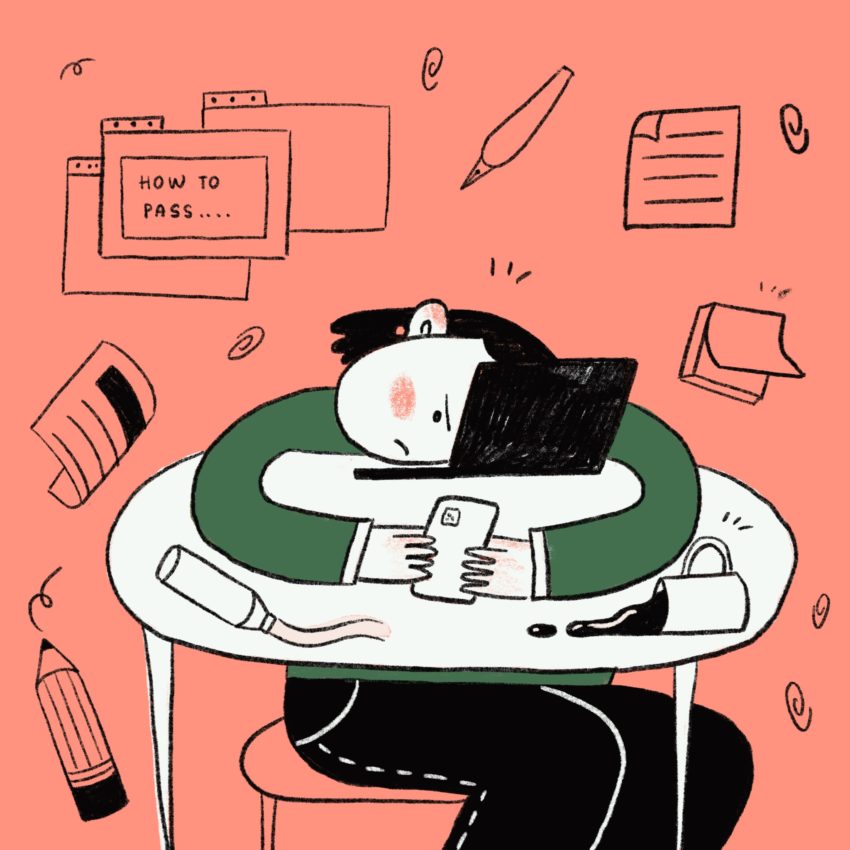
Throughout his career, Jon Bath, an art history professor at the University of Saskatchewan, has found that cheating is “most commonly an act of desperation” by students.
What happens during a pandemic, when university students across the board report heightened levels of stress?
“When you put that alongside the fact that, in most ways, it’s definitely easier to cheat when no one’s looking over your shoulder — that does put that temptation in place for students who are feeling challenged,” Bath said.
Academic misconduct on the rise
Although the exact numbers will not be released until the end of the academic year, the U of S has reported a hike in cases of academic misconduct at the university since the start of the COVID-19 pandemic. Nancy Turner, director of teaching and learning enhancement, says the university’s hasty move to online learning in March 2020 is behind the rise in academic misconduct since students have less oversight than they would in in-person classes.
Turner says that academic misconduct was not a big issue in online classes before the pandemic, since planning for those classes took into account the online format.
“Because we’ve had to move to remote [learning] in an unexpected way, across the board and for all of our courses, we’ve had to figure out ways to do assessments in a new context with new rules,” Turner said. “That’s really what’s been, I think, at the heart of the challenges we’ve seen in terms of academic integrity.”
What has changed with the pandemic?
Jamal Akhtar*, a computer science student, agrees with Bath that the pandemic itself also plays a role in students’ motivations for cheating. Although Akhtar stood incorrectly accused of academic misconduct in the Fall Term and was found not guilty in late January, he sympathizes with the pressures that might lead a student to cheating.
“Nobody is in the right frame of their mind right now, especially with this [pandemic] going on for so long,” Akhtar said. “No matter how studious a student you are, you just can’t lock yourself up in a room and stare at a screen and grasp all of this information that is being thrown at you.”
For Akhtar, remote learning also played a role in why he was accused of academic misconduct. With a good grade already secured for the class and no obvious motivation to cheat, he says that the “torturous” month he spent with an allegation on his name could have been avoided if his computer science professor had opened up a dialogue with him.
Akhtar was not offered the option to reach an informal resolution with his professor, whom he had never interacted with previously due to the mostly asynchronous nature of the class.
“I think it’s really harsh when you don’t let a student explain themselves,” Akhtar said.
Bath says that though his current process for dealing with academic misconduct is “largely the same” as before the pandemic, the online format has made some things harder.
“I try to take an understanding and impartial view when I do suspect a student of cheating — trying to get at the reasons why it’s happening,” Bath said. “It’s a little harder when, obviously, I’m not interacting with students in person and building that sort of relationship.”
Detection versus prevention
While students technically have less oversight in online classes, technology also offers new tools of detection. Akhtar was accused of academic misconduct on the basis of a plagiarism-detection software called Moss, which his professor used to compare students’ codes in the final exam. This would have not been possible in most exams before the move to online learning because students wrote the codes down on an exam paper.
Bath says that though online tools do give him more ways to surveil students, he often chooses not to utilize them.
“I don’t think it’s my job to run a police state in the classroom,” Bath said.
Turner says that the university also does not want to focus solely on detection when responding to the rise in cases of academic misconduct, but rather on prevention. She adds that professors are still building connections with students in the online environment that will help students succeed.
“Would I say that we’re as good at it as we could be? Probably not — we’re also learning as we teach in a new kind of way, and it does take a bit of time to get comfortable and understand the ways in which you can connect and build relationships online,” Turner said.
Solutions in a difficult time
To prevent cases of academic misconduct, Bath says his approach is to open up options to distressed students by showing them support.
“[I’m] trying to make it clear to students that they should contact me or contact other services on campus like mental health supports if they are in that kind of desperation situation,” Bath said. “Not doing great on an exam is still much better than getting zero or getting kicked out of university. Cheating is never a long-term answer.”
From his experience as a student this year, Akhtar says that, ultimately, there is no perfect way to prevent academic misconduct during a pandemic. Going forward, Akhtar hopes that the university will take into account that the current situation is not ideal for anyone.
“If I was in in-person classes, I would have gotten more out of my courses than I am now, taking the same course from my computer. So, I think they should also hold their expectations in that way,” Akhtar said. “If you are not giving us the 100 per cent, then students cannot be expected to give their 100 per cent. That’s not the way it works.”
*To protect their identity, the individual’s name has been changed.
—
Ana Cristina Camacho | Copy Editor
Graphic: Anh Phan | Design Editor
Leave a Reply